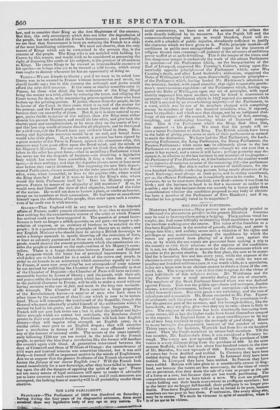THE PaESENT ELECTIONS. . . .
Mortxrxer Cirrtostretz—Many perSons are exceedingly puzzled to undtrstand time phenomena peculiar to the present Elections. Counties
may be said to be everywhere going a begging. The populous venal bo- roughs, too, find some difficulty in obtaining third candidates to prevent the two from walking over the course. The value of the franchise to a freeborn Englishman is the number of pounds, shillings, and pence it brings into him ; and nothing seems such a violation of? his rights and privileges as any understanding among the candidates by which the voters are prevented from playing off a third man against the two, or by which the out-voters are prevented from making a trip to the country to visit their relations at the expense of the .candidates. It is not, we think, difficult to account for the ciieumstances which are peculiar to the present election. In the first place, the sum to be scram- bled for is becoming less and less every year, while the expense of the elections is every year increasing. During the war, while we were ex- pending one hundred millions a year, it was worth while, as a speculation, to:lay out a large sum in an election contest to obtain a share of the con- tracts, &c. The temptation was at that time too great for the virtue of most individuals of this religioer, nation. Mr. Waithman and the City Patriots were a small minority during the sera of contracts. The members of the Stock Exchange huzzacd when war was declared against France. This was the golden age—loans and contracts, Jacobin alarms, a strong Government, bribery and corruption—all were dove- tailed into each other. But with peace came reckoning, and the race of calculators and economists. Mr. Hume succeeded to Mr. Pitt. Figures of arithmetic took tile place of figures of speech. The annuitants swal- low the greatest part of the revenue, and the borough-holders, like the horse-leech, may cry give, give—but they cry in vain—there is little to give. The expense .of elections has been continually increasing from many causes, till at last the higher ranks have found' themselves unequal to the expense. In England there is a great unwillinaness to let any set of men long continue to enjoy the monopoly of good things. Hence in many boroughs the progressive increase of the number of voters. Thirty years ago, for instance, Warwick had from five to six hundred voters. Then the Castle contrived to return both members. Till the late member, Mr. Ladbrooke's time, it was considered a Treasury bo- rough. The voters are now upwards of 1200. The purchase of 1200 voters is a very different thing from the purchase of 400. In the same manner Stafford, which had not above four hundred voters in the time of Mr. Sheridan, has now upwards of 860. Everywhere the number of voters has been doubled and trebled. In Coventry they have been trebled during the last thirty-five years In Leicester they have been trebled. In Liverpool they have been trebled. In Preston they have been trebled. Reform will take place to a considerable extent in Eng- land, not because the voters are less mercenary, for the ideas of voters are so perverted, that they deem the sale of a vote as proper as the sale of a horse or a cow, but because they are not worth purchasing. The competition seems now to have taken a turn. We now see profligate voters holding out their hands everywhere to profligate members ; but as the latter are no longer full-handed, their profligacy is no longer pro-
fitable. Free-born Englishmen will at last be forced to be pure, because


























 Previous page
Previous page